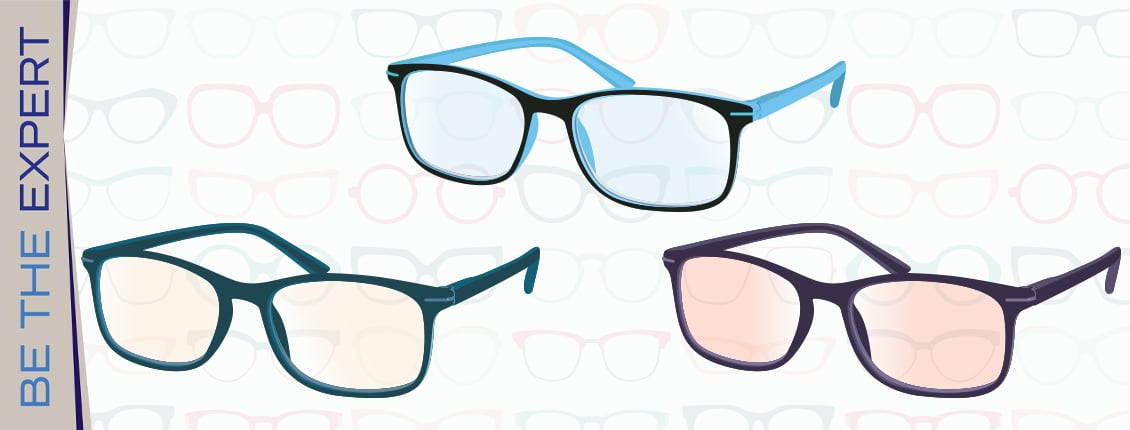
Alleviate Eye Strain from Staring at Screens
What is Blue Light?
Modern life has screens everywhere: televisions, computers, phones. It’s known that staring at so many screens, especially before bed, makes sleeping difficult. 70% of adults in America report they don’t get enough sleep at least once a month and 11% report they sleep insufficiently every night, a fact no doubt exacerbated by excessive screen time. Screens put out blue light, which keeps people awake, meaning they don’t get a decent night’s sleep.
And what is blue light? According to UC Davis, “Blue light is part of the visible light spectrum — what the human eye can see. Vibrating within the 380 to 500 nanometer range, it has the shortest wavelength and highest energy. About one-third of all visible light is considered high-energy visible, or ‘blue’ light.”
Screens put out blue light which is tied to eye problems , such as strain and fatigue. While this can seem like an impossible problem, since we use electronics every day, there are certain measures we can take to lighten the burden.
One measure people can take to protect themselves from blue light and its effects is to wear blue light glasses, especially at night before we go to bed. But what are these glasses and why should anyone care about them? Keep reading so that you can better understand these glasses and help your customers find the pair that’s ideal for them
What Are Blue Light Glasses?
One of the major problems with blue light is its effect on eyes. Blue light can cause blurry vision, eyestrain, cataracts, and more. The more someone looks at screens, the worse these problems can get.
These glasses are specially designed to combat these issues. Some of these glasses have a yellow tint, but not all. In fact, there are three different kinds of blue light glasses available, each for a specific need.
• The first has clear lenses that might have a colored reflection when looked at. These are computer glasses and they filter blue light by between 5-30%. These glasses are worn during the day.
• Yellow tinted glasses filter around 50% of blue light. For most people, these aren’t optimal during the day unless the user has an acute light sensitivity. These glasses are more useful for nighttime screen viewing.
• The third type of glasses have orange or red tinted lenses. These are called blue light blocking glasses and they block around 100% of blue light. These are worn exclusively at night. They provide optimal sleep when worn correctly, since they block so much blue light.
Sleep Benefits of Blue Light Glasses
Everybody has an internal clock that regulates their circadian rhythm, the biological cycle that influences our internal functions: when we sleep, when we wake up, our body temperature, and more. This rhythm responds mostly to light and dark.
Before electronics, our bodies responded to daylight or nighttime, letting us rise and sleep with the sun. With the introduction of streetlamps, longer workdays, and later, electronics, this rhythm has been distorted. Now, thanks to staring at screens, we stay up much later than our bodies should.
Blue light naturally makes us feel awake. During the day, this is good, since we need to be alert, but when we look at computer screens or phones before we want to go to sleep, this can backfire, and we don’t get a good night’s rest.
Because blue light glasses block the light from screens, this helps our bodies relax and produce the chemicals it needs to sleep peacefully. According to Healthline, there are studies that show that when people use blue light glasses, even if they’re using an electronic device, they’ll produce as much melatonin as if it were dark. Melatonin is a hormone that aids in the control of the sleep-wake cycle, necessary for getting a good night’s rest.
Studies have shown that people who wear blue light glasses experience better sleep and less wakefulness after going to sleep. Using these glasses correctly can help us sleep better and as a result, be healthier overall.
How to Wear Blue Light Glasses Safely
You might be thinking “Why don’t I just wear blue light glasses all day, every day, if they’re so useful?” The problem with this plan is that, even though blue light can impact us negatively, we need to be exposed to some degree of it to function correctly.
Blue light helps us feel alert and productive. If we remove more than 30% of blue light during the day we no longer feel as awake or happy. In addition, If we wear orange or red lenses during the day, we’ll interfere with our eye’s ability to use the rod and cone system, hurting us in the long term.
So, what do you do to avoid that problem? If it’s sunny, you can wear computer glasses since their lenses are generally not tinted, meaning your eyes can work properly. After sunset, you can wear tinted glasses that will block blue light and help you sleep better.
Conclusion
Blue light glasses can be very helpful, but it’s important to wear the correct lenses at the correct time. Your customers shouldn’t wear yellow, orange, or red tinted glasses during the day, since getting some blue light is essential for health. Instead, they should wear them at night while looking at screens to prevent their sleep schedule becoming messed up.
To browse Petra’s lineup of blue light glasses, check out order.petra.com.

